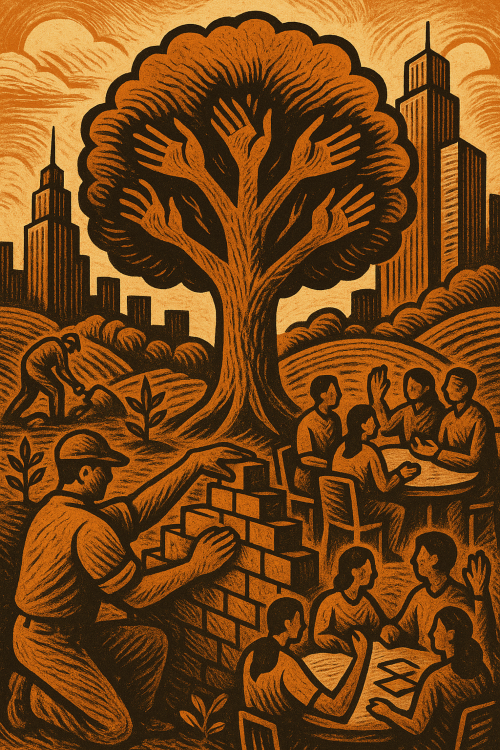Beyond Spectacle: Democracy as Daily Practice
Democracy isn't voting every few years. It's a way of life, co-creation, care, and collective power. To move beyond spectacle, we must reclaim democracy as daily practice, not performance.

Democracy in America has been reduced to spectacle – a performance of participation that substitutes ritual for substance. We vote every few years, follow political theater on cable news, and mistake consumption of political content for genuine civic engagement. Meanwhile, the actual machinery of governance remains firmly in the hands of those whose interests directly oppose most Americans'.
Breaking free of this trap requires reimagining democracy not as an event or institution but as a daily practice – a way of relating to one another and organizing our collective life that disperses rather than concentrates power.
This reimagined democracy would be grounded in economic as well as political transformation. It would build worker cooperatives and community land trusts to democratize ownership. It would establish public banks and participatory budgeting initiatives to give communities direct control over financial resources. It would fight for universal programs like Medicare for All and tuition-free college – not just because they improve lives, but because they shift power from corporations to citizens.
On the political front, it would radically expand voting rights through automatic registration, Election Day holidays, re-enfranchising the formerly incarcerated, and ending racist voter ID laws and partisan gerrymandering. It would implement public financing for elections to free candidates from big donors and corporate PACs. It would experiment with new forms of citizen deliberation, from community assemblies to sortition-based legislative bodies that better represent the actual population.
Most importantly, it would cultivate solidarity across traditional divides, recognizing that authoritarianism and oligarchy can only be defeated by multiracial, cross-class coalitions refusing division. It would move beyond single-issue campaigns toward intersectional justice connecting our cascading crises.
None of this will come from existing power centers, too invested in preserving the status quo. The leadership we need emerges from communities and movements fighting for survival and dignity at the margins – not appealing to the conscience of the powerful but building power from the ground up.
This could mean creating parallel institutions that bypass gatekeepers and directly meet community needs. It could mean launching electoral campaigns accountable to movements rather than party machines. It could mean direct actions and strikes disrupting business as usual to create legitimacy crises for the ruling class. It certainly means new alliances bridging traditional divides around shared visions of economic and racial justice.
The task is generational, requiring patience, persistence, and learning from both victories and defeats. The forces of reaction will not cede power without bitter struggle. But as daunting as the road appears, the alternative is descent into a darkness from which we may never emerge.
In this struggle, we might rediscover something precious lost in empty democratic rituals: the idea of democracy not as spectator sport or consumer product, but as a way of life – a daily practice of co-creation, radical empathy, and building the world we wish to inhabit.
This vision of democracy offers not a perfect endpoint but an ongoing journey of collective liberation, beginning with the revolutionary act of stepping outside the rigged game to build something new together. The question isn't whether such democracy is possible, but whether we have the courage and imagination to make it real.
The System Isn’t Broken. It’s Built This Way.
What looks like backsliding is really blueprint execution. Selective tolerance, performative opposition, bipartisan decay—it’s not dysfunction. It’s design.
The full dossier unmasks how democratic language cloaks authoritarian machinery—and why waiting for institutions to save us is part of the trap.
No ads. No TED Talk tone. Just strategy, history, and hard truths.
🧾 Every claim has a receipt. Check the source files, citations, and footnotes we weren’t supposed to find.
